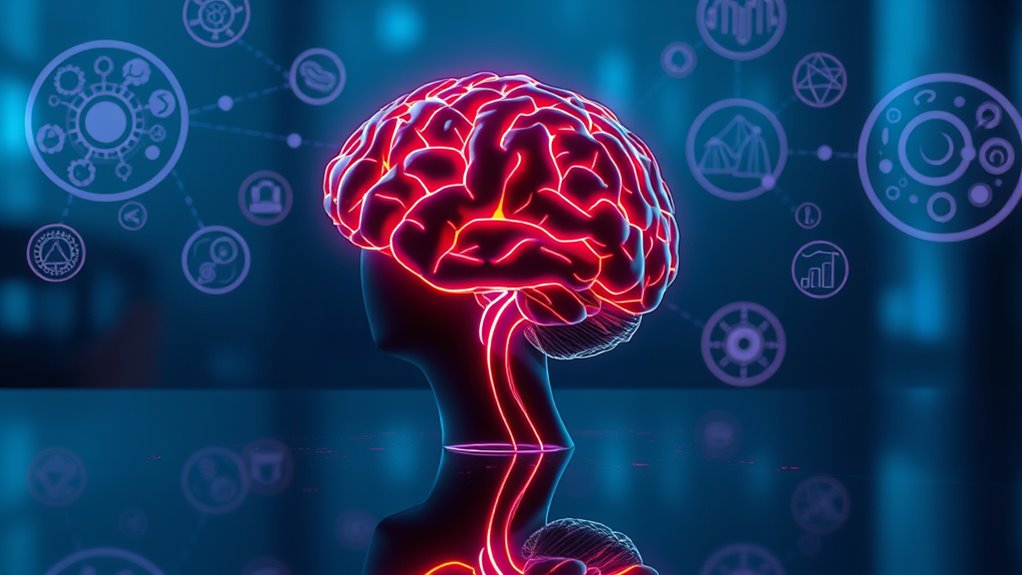Metacognition means actively thinking about your own thinking processes to boost learning and problem-solving skills. It involves being aware of your strengths, weaknesses, and how you approach tasks, then adjusting strategies as needed. Using tools like planning, monitoring, and evaluating your progress helps you learn more efficiently. Developing this skill makes your learning more intentional and effective. If you keep exploring, you’ll discover more ways to refine your thinking and improve your growth.
Key Takeaways
- Metacognition involves awareness and regulation of one’s own thinking processes to improve learning and problem-solving.
- It includes components like planning, monitoring, and evaluating one’s understanding and strategies during tasks.
- Cognitive strategies such as questioning and summarizing support effective thinking and retention.
- Self-awareness in metacognition helps identify strengths and weaknesses to tailor learning approaches.
- Practicing metacognition enhances active learning, self-regulation, and fosters a growth mindset.

Have you ever wondered how you know what you know? It’s a question that taps into your awareness of your own mind—your ability to reflect on your thoughts, feelings, and learning processes. That’s fundamentally what metacognition is all about. It’s your capacity to think about thinking, to step outside your immediate mental activity and analyze how you’re approaching a problem or learning something new. Developing this skill allows you to become more effective at learning, problem-solving, and adapting to new situations. At its core, metacognition involves self-awareness, which means understanding your strengths, weaknesses, and the ways you process information. When you’re aware of how you learn best, you can tailor your approach, using cognitive strategies that suit your style.
Metacognition is thinking about your thinking to improve learning and problem-solving.
Cognitive strategies are the tools you use to manage your thinking and learning processes. They include techniques like summarizing information, questioning assumptions, or breaking complex tasks into manageable parts. When you’re practicing metacognition, you intentionally select and apply these strategies based on your awareness of what’s working and what’s not. For example, if you find yourself struggling to remember a chapter, you might pause to ask, “Am I really understanding this material?” This reflective step helps you identify gaps in your comprehension and decide whether to re-read, take notes, or discuss the content with someone else. You’re actively engaging in a cycle of planning, monitoring, and evaluating your learning, which enhances your ability to retain information and solve problems more effectively.
Building self-awareness through metacognition isn’t just about recognizing your weaknesses; it’s also about acknowledging your strengths. When you understand what cognitive strategies work best for you, you can leverage them to maximize your productivity. For instance, if you know that visual aids help you grasp complex concepts, you’ll seek out diagrams or charts to reinforce your understanding. This ongoing process of self-assessment helps you become a more autonomous learner, capable of adjusting your approach as needed. Additionally, cultivating self-awareness and understanding your learning preferences can improve your ability to adapt to various educational and real-world scenarios. This continuous reflection helps in developing a growth mindset, where you see challenges as opportunities to improve rather than insurmountable obstacles.
In essence, practicing metacognition puts you in the driver’s seat of your own learning journey. By cultivating self-awareness and mastering cognitive strategies, you gain insight into your thinking patterns. This awareness makes your learning more intentional, efficient, and adaptable. Over time, it transforms how you approach new information, helping you become not just a passive receiver but an active, reflective participant in your education and personal growth.
Frequently Asked Questions
How Can I Improve My Metacognitive Skills Effectively?
To improve your metacognitive skills effectively, focus on self-reflection strategies like journaling your thoughts and reviewing your learning process regularly. Use goal setting techniques to define clear, achievable objectives, which helps you stay aware of your progress. Ask yourself questions about what’s working and what isn’t, then adjust your approach accordingly. Practicing these strategies consistently will enhance your awareness of your thinking and learning habits.
What Are Common Barriers to Developing Metacognition?
You might face self-awareness challenges that make it hard to recognize your own thought patterns, and overconfidence pitfalls can cause you to underestimate your learning gaps. These barriers hinder your ability to reflect accurately and improve. To overcome them, stay open to feedback and regularly question your assumptions. Being honest with yourself helps develop better self-awareness, while avoiding overconfidence keeps you motivated to learn and grow.
How Does Age Influence Metacognitive Abilities?
As you age, your metacognitive abilities are influenced by age-related cognitive changes and developmental milestones. Younger individuals often develop these skills earlier, improving self-awareness and regulation, while older adults might experience declines that affect these abilities. However, ongoing learning and mental stimulation can help maintain and even enhance metacognitive skills across different ages. Recognizing these patterns allows you to adapt strategies for better self-monitoring and learning throughout your life.
Can Metacognition Be Taught to Children With Learning Disabilities?
You can teach children with learning disabilities to develop metacognitive strategies by focusing on their specific needs. Using targeted activities, you help them become aware of their thinking processes and learn how to plan, monitor, and evaluate their understanding. By encouraging reflection and self-questioning, you empower them to improve their learning. With consistent support, metacognition can be effectively cultivated, boosting their confidence and academic success.
What Are the Latest Research Findings on Metacognitive Training?
Imagine opening a hidden door to your mind—research now shows metacognitive training boosts cognitive awareness and self-regulation. Recent findings highlight the importance of targeted metacognitive assessment, which helps identify skill gaps and tailor interventions. You can enhance learning by teaching children strategies to monitor and evaluate their thinking processes, leading to improved problem-solving and academic success. This evolving research underscores the power of metacognitive skills in fostering lifelong learning.
Conclusion
As you master metacognition, you become your own Sherlock Holmes, constantly analyzing your thoughts and strategies. This skill helps you learn faster, solve problems more creatively, and avoid pitfalls. Remember, even in a world full of AI and quantum computing, the ability to think about your thinking remains timeless. Like a wise Jedi, harness this power now, and you’ll navigate life’s challenges with clarity and confidence—no DeLorean needed.









